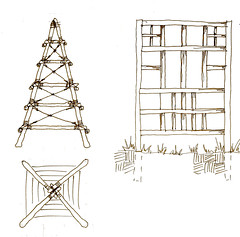Great Advice For Gardeners Of All Ages
You can use many resources to learn more about gardening. You could spend an entire day online looking for the gardening information you nee...

You can use many resources to learn more about gardening. You could spend an entire day online looking for the gardening information you need. If you are ready to start creating your own garden you don't have to learn everything there is to know about gardening, but you will want to pay attention to a few important steps that can increase the success you will have with planting and maintaining your garden. Check them out.
Choose higher yield plant varieties. In many cases, a disease-resistant or cold-tolerant hybrid will produce a higher yield than a traditional variety.
When you plant a seed, take your time. Water the soil first. Next you need to spread the seeds out evenly so they have the room needed to grow. Multiply the size of each seed by three and bury the seed that deep. Not all seeds are meant to be buried in soil, there are certain types of seeds that only grow in the light.
Whenever you are planting a veggie garden, it is vital that you place them in a location where sun shines down on them for six or more hours per day. Many veggies require this amount to properly grow at a faster pace. This is the same for many varieties of flowers.
It is possible to use natural materials as well as other plants to help keep pests away from your garden. A good way to keep slugs away is to create a border with onions around a garden with vegetables. Marigolds would do this trick as well. Using wood ash as mulch around the base of trees and shrub seedlings will also help keep away insect pests. Natural materials and plants can be just as effective as chemical pesticides at keeping unwanted visitors out of your garden!
Start your plants in containers, and then transplant the seedlings into the garden later on. This really increases the survival rate of young plants. This also helps tighten time between plantings. You will have healthy seedlings that are ready to be planted when you get rid of old plants.
Choose perennials that won't be taken out by slugs. Snails and slugs can do irreparable damage to your garden in a single night. These pests prefer plants with thin smooth leaves. Plant some helleborus or euphorbias along with your other perennials. Perennials that have thick, furry leaves and unpleasant tastes are less likely to attract slugs and snails. Some of examples of these are achillea, heuchera, campanula, helleborus, and euphorbia.
If clay pots become encrusted with salt, it can be easily removed with a mixture of alcohol and vinegar. It is common for build-ups of salt to accumulate over long periods of time on pots made of clay. Dust the pot lightly with a mixture of alcohol, vinegar and water. After you have completed the previous step, begin scrubbing the inside with a fairly common cleaning brush. Rinse off the extra solution, then leave it be for a while before you put anything else in the pot.
The hobby of gardening can bring lifelong joy. As you learn more techniques, your skill in the garden will improve. You should accumulate lots of valuable information on gardening. So, use the tips you just learned from this article and before you know it your garden will be that much closer to your dream garden as possible.